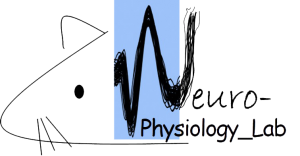 |
|---|
Overview
The Neurophysiology & Behavior Laboratory investigates the neuronal correlates of behavior in the brain of animal models. We know that motor and cognitive behavior is constantly changed by different factors such as stress, aging or physical activity. The challenge is to identify the neuronal activity code that makes these behavioral changes possible.
Both acute and repetitive exposures to stress can lead to cognitive deficits, and, ultimately, facilitate the development of psychiatric disorders. Our goal is to better understand how stress changes the activity of neurons in the brain, in the short- and the long-term, and how this impacts cognitive behavior (i.e. learning and memory, flexibility).
Research
The Neurophysiology & Behavior Laboratory is located in the Thad Cochran Research Center on campus (Animal Facility). We perform the surgical implantation of electrode arrays to record the activity of neurons in the brain of behaving rats. Cognitive behavior is evaluated in operant chambers.
Ongoing projects:
- Effects of acute stress on cognitive flexibility
- Tracking the neuronal correlates of aversive and rewarding events in the prefrontal cortex
Recent selected publications:
Del Arco, A., Park, J., Wood, J., Kim, Y., Moghaddam, B. (2017) Adaptive encoding of outcome prediction by prefrontal cortex ensembles supports behavioral flexibility. J Neurosci. 37: 8363-8373.
Ronzoni, G., Del Arco, A., Mora, F., Segovia, G. (2016) Enhanced noradrenergic activity in the amygdala contributes to hyperarousal in an animal model of PTSD. Psychoneuroendocrinology 70: 1-9.
Junchol, P., Wood, J., Bondi, C., Del Arco, A., Moghaddam, B. (2016) Anxiety evokes hypofrontality and disrupts rule-relevant encoding by dorsomedial prefrontal cortex neurons. J Neurosci. 36: 3322-3335.
Del Arco, A., Ronzoni, G., Mora, F. (2015) Hypofunction of prefrontal cortex NMDA receptors does not change stress-induced release of dopamine and noradrenaline in amygdala but disrupts aversive memory. Psychopharmacology 232: 2577-2586.
Contact
For more information about research in our Neurophysiology & Behavior Laboratory, contact our lab director.